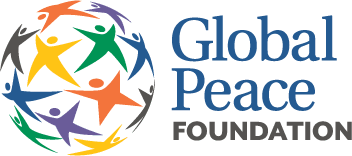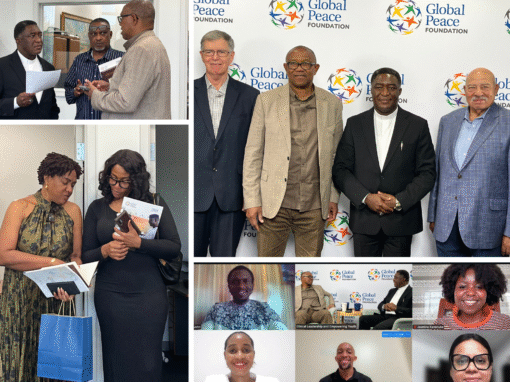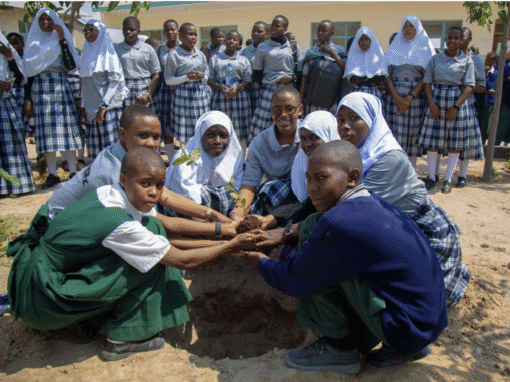Global Peace Convention 2023 concluded in Manila with an agenda for public service, civic engagement, and peace through shared values and shared identity as part of one human family.
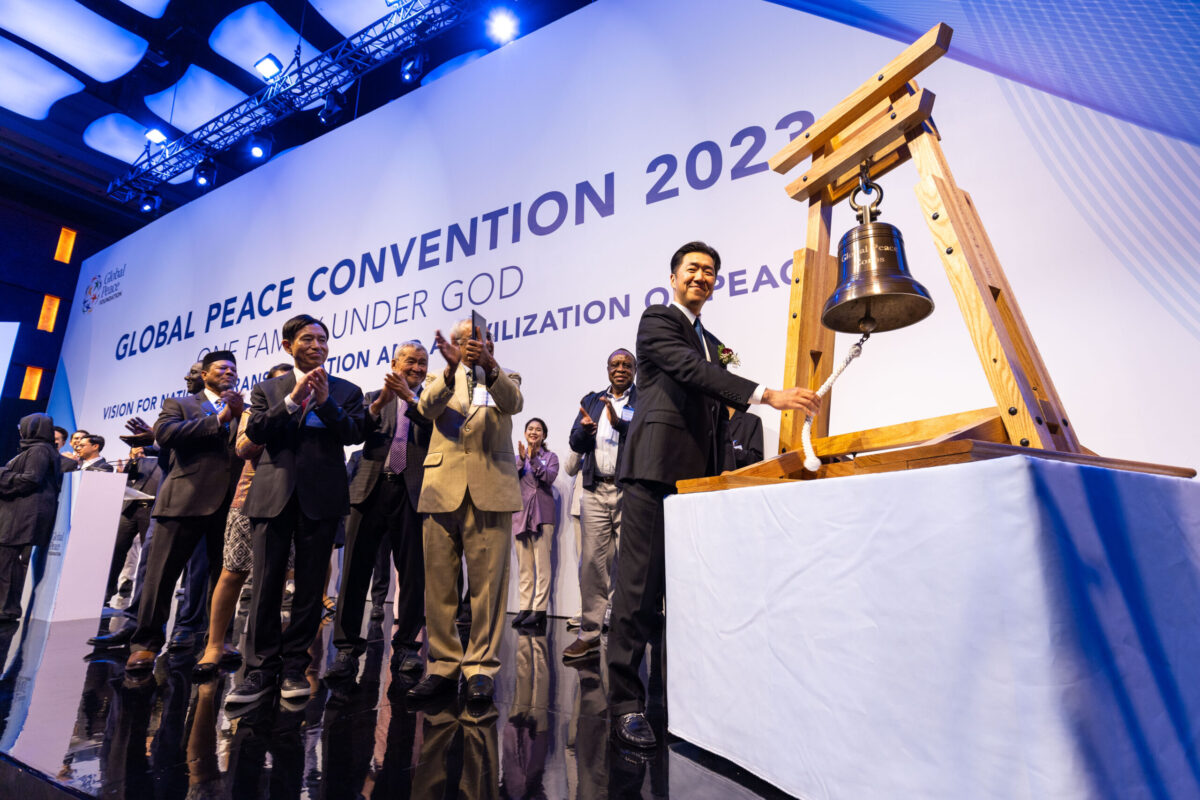
The ceremonial launch of the Global Peace Leadership Corps at the concluding plenary at the 2023 Global Peace Convention in Manila.
Global Peace Foundation International President James Flynn welcomed peace advocates from around the world to the concluding plenary sessions of 2023 Global Peace Convention (GPC 2023) in Manila on December 14. “We are excited to be convening here again in this vibrant island nation with its rich diversity and unique history,” Mr. Flynn said. He praised “the heart and character of the Filipino people, as beautifully expressed in your national motto, ‘for the love of God, people, nature and country.’”
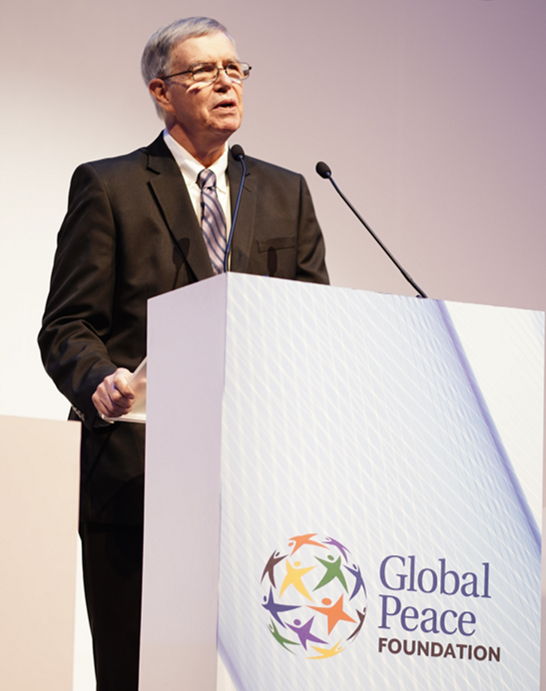
GPF President James Flynn welcomes convention participants.
The theme of GPC 2023, “One Family under God: Vision for National Transformation and Civilization of Peace is “a big idea,” Mr. Flynn said. It involves “efforts on all levels of society to strengthen resilience and cohesion, to move beyond the vicious cycles of conflicts, and to focus on our shared humanity, our most essential identity as part of the one human family.”
GPC 2023 convened in a hybrid format with both in-person and virtual meetings, engaging thousands of participants from 94 nations. Virtual sessions beginning on November 1 addressed key issue areas to improve security, address root causes of conflict, affirm rights of faith and conscience, strengthen resilience and cohesion in communities, and support meaningful participation of women and youth in decision-making.
In-person events in the Philippines included the Global Peace Youth Festival, International Forum on One Korea, Educators’ Congress, and Global Peace Awards Gala.
Transforming education
GPC 2023 is the third bi-annual convention hosted in the Philippines since the inaugural assembly in 2009. Among the Global Peace Foundation’s most important ongoing initiatives has been work in collaboration with the Philippines Ministry of Education to develop holistic education that focuses on character development, relationships, skills, and knowledge application.
First addressing the plenary, Sister Merceditas Ang, SPC, president of St. Paul University and a leading advocate for educational innovation in the Philippines, stressed three priorities to support future-ready learning: values and character formation as the foundation for human development and social transformation; application of academics and life skills so that learners are creative and productive for national development; and peace education and global citizenship to embrace diversity and care for the welfare of people, the environment, and global community.

GPC 2023 plenary speakers Sister Merceditas Ang (left) and Ambassador Dino Patti Djalal (center). At right international participants during the plenary session.
“Peace springs forth from the heart and resonates through the mindset, values, and actions,” Sr. Ang said. “Peace can only thrive when there is humility, openness, understanding, compassion, forgiveness, empathy, respect and charity.”
Ambassador Dino Patti Djalal, the founder and chairman of the Foreign Policy Community of Indonesia, jokingly said the name of his speech, “Love is a Geo-Political Force,” could get him in trouble in academic or diplomatic circles.
Yet other emotions have proven to be geo-political forces, he observed, such as hatred and ambition in Nazi Germany, and exploitation and oppression in many colonial governments.
He cited the example of Nelson Mandela, who could have called for retribution for his imprisonment by the South African apartheid regime but chose peace and worked to transform a nation based on multiracial equality and tolerance. “Love indeed became a geo-political force,” the ambassador said.
“Peace springs forth from the heart and resonates through the mindset, values, and actions. Peace can only thrive when there is humility, openness, understanding, compassion, forgiveness, empathy, respect and charity.”
He also described his experience just entering government service when the tsunami struck Indonesia in 2004, causing massive destruction and costing the lives of some 200,000 people. “We desperately needed help, and help came from American military, the Chinese, Japanese, Australian, Philippine, and many others.”
The coordinated effort ranked as largest military operation since World War II, he said, and was done out of love of humanity. “Love is sentimental; but in life, love is as realistic as it gets.”
Toward a civilization of peace
GPC 2023 reflected the interesting and diverse backgrounds of global peacemakers. Bishop Sunday Onuoha, president of Vision Africa, has worked with Christian and Muslim leaders in Nigeria to mitigate extremist violence and create space for reconciliation and healing in some of the most violence-torn regions.
Bishop Sunday talked about African values and the socialization of a native African child who is nurtured by many. “I was raised by parents and grandfather, and uncles and extended family members, then under guidance of seniors as a seminary student. If not for guidance of the many people on my journey I would be like a zebra without stripes. Our task must be to free ourselves from the prison by widening our circles of compassion to embrace all living beings and also nature.”
Bishop Sunday said it was important “to work at diminishing social and economic divides, acknowledge the uniqueness of world sociocultural formations, and intentionally engineer toward a civilization of peace. Really, it takes a village. Indeed, it takes a community.”

Nigerian Bishop Sunday Ohaha (left) and former Guatemalan President Vinicio Cercezo (center) address the main plenary. At right participants network during session breaks.
One of the leading political reformers in Latin America and the first democratically elected president of Guatemala (1986-1991), Vinicio Cerezo told assembled leaders that “peace is not a goal; it is a path, a way of life.”
A founding member of the Latin American Presidential Mission, President Cerezo said it is necessary for humanity to bring forward nations that have been left behind. Noting the important work of international institutions that emerged after World War II, the former president said it was essential that institutions continue to adapt to the “ever-evolving story of humanity.” He stressed the existential threat of climate change and said, “our challenge is to maintain peace by adopting an economic and development model in harmony with nature, be architects of the future where innovation is guided by ethics, linked not only to conservation of the planet but of our species.”
A new global identity
Delivering the keynote address, Global Peace Foundation Chairman Dr. Hyun Jin Preston Moon assessed the trajectory of societies that lose a unifying moral framework and shared acceptance of absolute values.
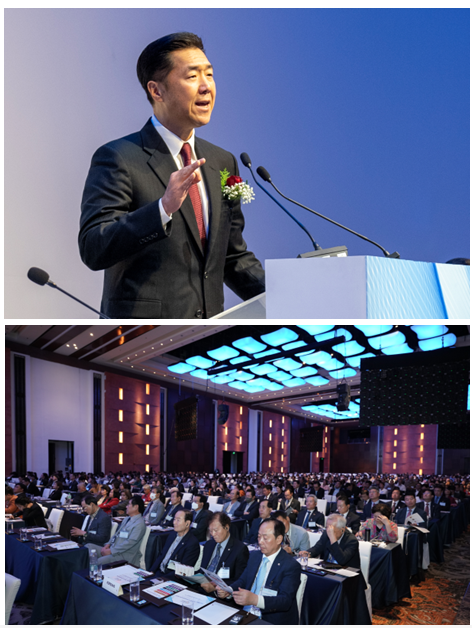
Global Peace Foundation Chairman DR. Hyun Jin P. Moon addresses the main plenary session.
“The world’s great cultural spheres stand upon the foundation of major faith traditions such as Judaism, Christianity, Islam, Buddhism, Hinduism, Confucianism, and many others,” the GPF chairman said. “The elements of truth which they expressed was a cohesive force that bonded local societies to have civilizational impact.
“Losing this unifying center, societies fragment and devolve into different identity groups, fighting each hour each other for power over their rivals. Remember that in the absence of an overarching unifying vision that is morally rooted, democracies and free markets simply become an arena where competing interest groups game the system to vie for advantage at the expense of their rivals.”
The same phenomenon he said is happening on the global level. “Clearly, we need to forge a new global identity that can embrace and harmonize the positive elements of more localized identities. Such an identity must be rooted in the universal principles that all the great spiritual and ethical traditions share.”
Following the chairman’s speech, presentations of key GPF field work underscored the convention theme of shared values and human identity as a framework for peace.
Bishop Dr. Paul Murray, Vice President of Religious Freedom Initiatives for the Global Peace Foundation, described efforts to uphold essential guarantees of conscience, faith, and belief, and threats these core freedoms face across the globe.
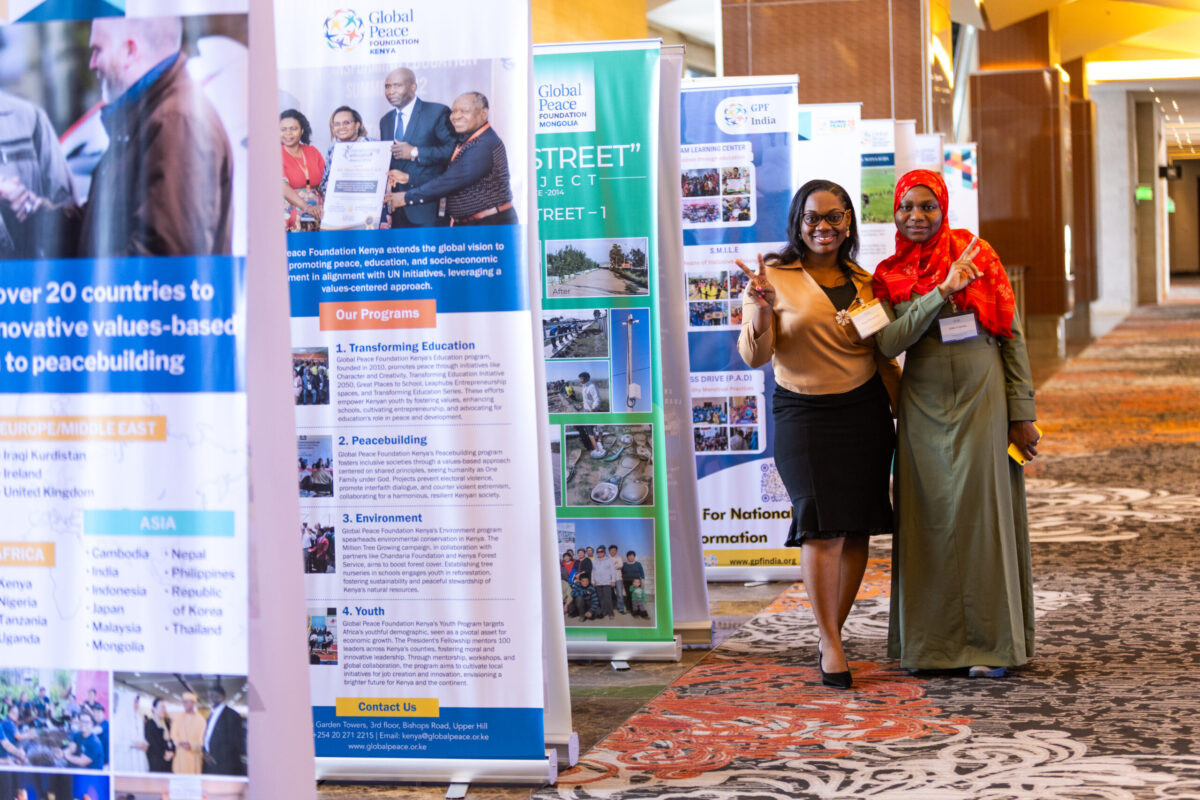
Dr. Margaret Ballesteros, International Cooperation Office at the Department of Education of the Philippines, highlighted comprehensive GPF work in collaboration with the Department of Education to transform education in the Philippines.
Dr. Emanuel Pastreich, Senior Fellow in the Office of Strategic Partnerships for the Global Peace Foundation, presented GPF’s ongoing efforts to advance consensus and international support for free and unified Korea.
Representatives of Global Peace Women (GPW) outlined significant work globally to advance women’s leadership and support for the family as important social objectives to foster peace and human welfare. Dr. Nona Ricafort, president of GPW Philippines; Rev. Canon Rosemary Mbogo, former provincial secretary of Anglican Church of Kenya and chairperson of the National Council of Churches of Kenya, and Ms. Hanako Ikeno, International President of GPW on behalf of Chairwoman Dr Junsook Moon, addressed the plenary session.
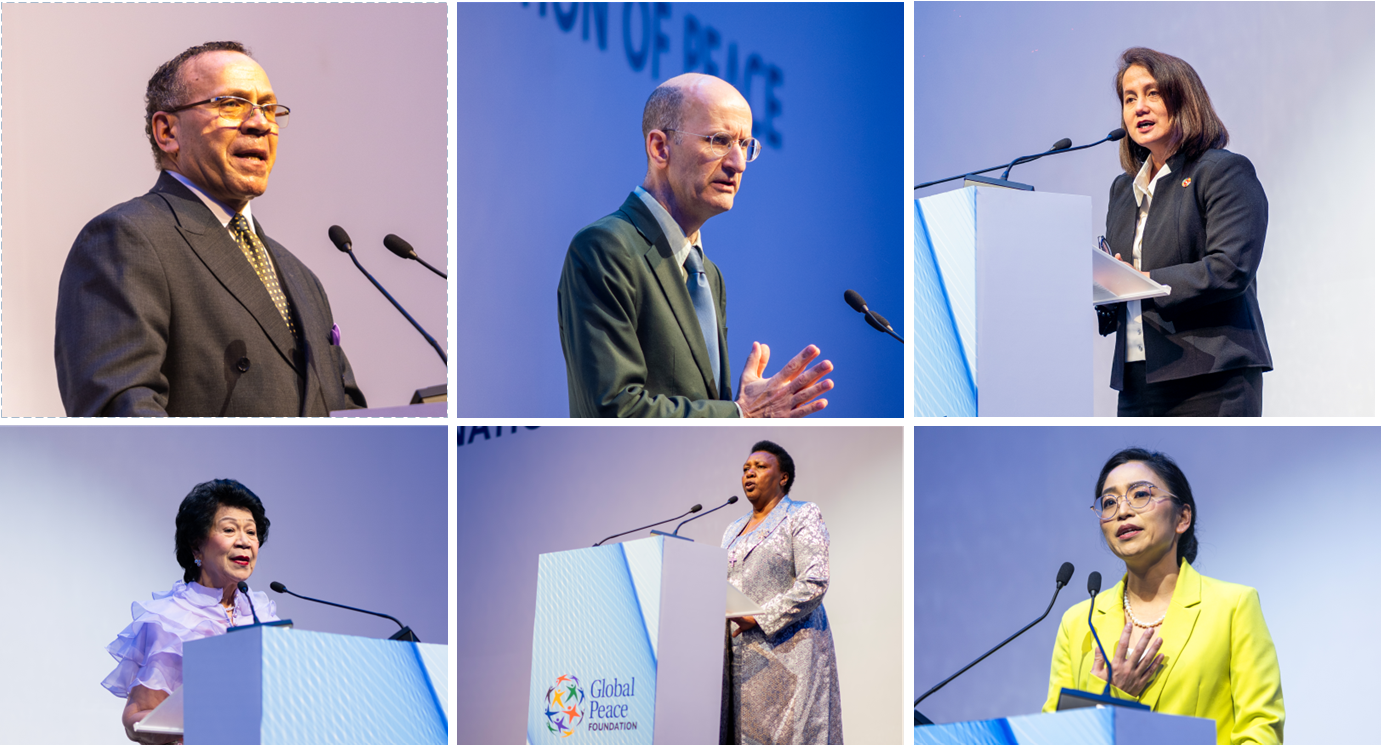
Featured plenary speakers highlighted GPF programs and projects. Top, from left: Bishop Dr. Paul Murray, Dr. Emanuel Pastreich, and Dr. Margaret Ballesteros. Below: Global Peace Women representatives, from left: Dr. Nona Ricafort, Rev. Canon Rosemary Mbogo, and Ms. Hanako Ikeno, representing GPW Chairwoman Dr Junsook Moon.
Concluding the 2023 Global Peace Convention, GPF leaders and partners officially launched a new initiative, the Global Peace Leadership Corps, as an international, cross-cultural peacebuilding and service program. Through the Global Peace Leadership Corps, a new generation of young leaders can develop and apply values of global citizenship and service for the greater good in the cause of peace.
To learn more about GPC 2023 and for on-demand sessions visit Global Peace Convention 2023.
